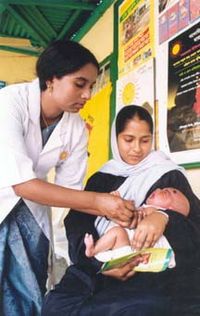
Photo from wikipedia
Background Depression is one of the leading contributors to the global burden of disease and often has an onset during adolescence. While effective treatments are available, many low-income countries, such… Click to show full abstract
Background Depression is one of the leading contributors to the global burden of disease and often has an onset during adolescence. While effective treatments are available, many low-income countries, such as Malawi, lack appropriately trained health providers in community health settings, and this limits access to effective mental healthcare for young people with depression. To address this need, a Canadian-developed youth depression Pathway to Care Model, linking school-based mental health literacy interventions to training of community healthcare providers, was adapted for use in Malawi and successfully applied. Methods A sample of healthcare providers (N = 25) from community health clinics (N = 9) were trained in the use of comprehensive, systematic clinical interventions, addressing the identification, diagnosis, and treatment of depression in youth who had been referred from schools where mental health literacy interventions had been implemented. Referral outcomes were obtained using a standardised clinical record form. Results Over 120 clinical outcome forms were available for analysis. Seventy percent of youth referred by their teachers were diagnosed with depression. Most youth diagnosed with depression identified physical symptoms as their primary difficulty. Available standardised outcome measures applied by clinicians indicated that, overall, youth showed positive outcomes as a result of treatment. Conclusions Community healthcare providers in Malawi were trained in the identification, diagnosis, and treatment of youth depression. When this training was applied in usual clinical care to youth referred from schools, it led to generally favourable clinical outcomes. To our knowledge, this is the first demonstration of a clinically feasible intervention that results in positive outcomes for young people with depression in Malawi, and it may provide a useful model to replicate elsewhere in sub-Saharan Africa.
Journal Title: Malawi Medical Journal
Year Published: 2017
Link to full text (if available)
Share on Social Media: Sign Up to like & get
recommendations!